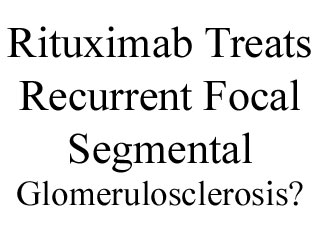
The study began with the patients, working in a ‘bedside to bench and back to bedside process.’ The team are apparently aware of a similar case in which rituximab had been administered to two lymphoma patients and it seemed to work against their kidney problem too. The cancer drug was scrutinized for over 40 patients by using the biopsy tissue and serum obtained from kidney transplant patients.
Rituximab is a certain monoclonal antibody that aims at the CD20 molecule present on the surface of B-cell lymphocytes. Kidney cells, also known as podocytes seem to show specific properties similar to B-cells, which led the team to document that podocytes and not B-cells were involved in the working of the drug.
Individuals, who encounter repeated cases of FSGS, seem to show a reduction in the level of protein, SMPDL-3b that adjusts lipids present at the plasma membrane. It apparently came to fore that rituximab stores SMPDL-3b and seems to directly unite and protect kidney cells by regulating the lipids at the plasma membrane. Notably, the recurrence rate of patients given rituximab went down from 64 percent to 26 percent.
“The finding is also unique as it uncovers an assay that can be used before transplant to identify patients at risk for recurrent disease and to guide therapeutic decisions, allowing for a personalized medicine approach,†specified Alessia Fornoni, assistant professor of medicine in the Division of Nephrology and Hypertension, and the lead author of the study.
The scientists believe that the study is likely to unveil new clinical indications for rituximab beyond its original function and lead to new pathways involved in regulating cell function. They noted that this result apparently came forth with a single dose of the drug administered to patients within 24 hours of kidney transplant. The study is ought to progress by expanding the application of ritumaxib to adult FSGS patients that faced transplants. According to the team the result can be seemingly implied for many other diseases like atherosclerosis and diabetes too.
The study is published in the June 1 edition of the journal Science Translational Medicine.
